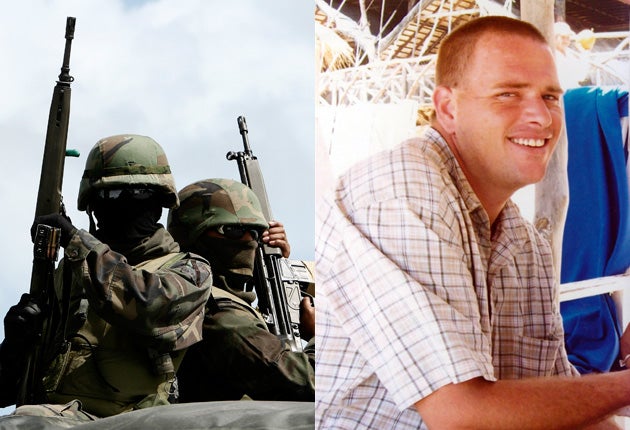Your support helps us to tell the story
From reproductive rights to climate change to Big Tech, The Independent is on the ground when the story is developing. Whether it's investigating the financials of Elon Musk's pro-Trump PAC or producing our latest documentary, 'The A Word', which shines a light on the American women fighting for reproductive rights, we know how important it is to parse out the facts from the messaging.
At such a critical moment in US history, we need reporters on the ground. Your donation allows us to keep sending journalists to speak to both sides of the story.
The Independent is trusted by Americans across the entire political spectrum. And unlike many other quality news outlets, we choose not to lock Americans out of our reporting and analysis with paywalls. We believe quality journalism should be available to everyone, paid for by those who can afford it.
Your support makes all the difference.A relentless campaign by a grieving mother has forced the Mexican government to admit that its troops gunned down an innocent US citizen at a military checkpoint outside Acapulco, and then put an assault rifle in the dead man's hands to try to fool investigators into thinking he had opened fire on them.
After Donna Proctor spent weeks pressing American officials for their help in the case, she finally received confirmation, via the US embassy, that three soldiers have been charged with killing her son Joseph, a 32-year-old New Yorker, in the early hours of 22 August. Two more are being prosecuted for planting an AR-15 rifle at the scene during the alleged cover-up, and then giving false evidence to military prosecutors.
Mr Proctor's death is one of three high-profile incidents this year when innocent bystanders have been shot deliberately or caught in the crossfire between the army and drug gangs, then publicly accused of being criminals.
According to documents held by the US Defence Department, and made public by his mother yesterday, Mr Proctor was driving to a shop from the house of his girlfriend, Liliana Gil Vargas, when he came across a checkpoint manned by soldiers.
The troops tried to stop Mr Proctor and inspect the vehicle, but claim he fled, prompting one of them to open fire. They pursued the van and fired again, "wounding the driver who nonetheless continued to drive away, fleeing, crashing the car 3km down that road", according to investigators' evidence.
Mr Proctor was found dead at the scene. When it emerged that he was unarmed, the battalion commander told an officer to place the AR-15 in his vehicle "using the hands of the deceased to try to simulate an attack against military personnel". according to a witness. The media was later told that Mr Proctor attacked a military convoy.
Like all alleged abuses by Mexican soldiers, Mr Proctor's death is being dealt with by an opaque military court system, which has convicted just one officer in the past four years. Until the case is heard, both the US and Mexican defence departments are refusing to comment on it publicly.
That isn't good enough for Mrs Proctor. She has cast doubt on every detail of the army's story, saying her son, who had lived in Mexico for a year and was attempting to open a restaurant, had repeatedly complained about being forced to pay bribes to local troops.
"He loved life," she told Associated Press. "I hate the fact that he died alone and in pain in such an unjust way... I want him to be remembered as a hardworking person. He would never pick up a gun and shoot someone."
Mexican officials recently visited Mrs Proctor at home in Long Island, she added, and compensated her for the cost of returning his body to the US. "I told them I had no intention of this being the end of it," she said. Mr Proctor's murder, as he drove his van in the beach town of Barra de Coyuca, is unlikely to affect Washington's unswerving support for Mexico's ongoing "war on drugs". But it will increase public scepticism, in both countries, about methods being used to pursue it.
In recent years, the Mexican President, Felipe Calderón, has largely devolved responsibility to his army for cracking-down on the highly-lucrative cross-border cocaine trade.
The tactic has resulted in significant victories, including the arrest of a slew of the country's most feared cartel leaders. But there is growing criticism of the "wild west" mentality of some soldiers. The army has been accused of roughly 4,000 acts of abuse since 2006.

Join our commenting forum
Join thought-provoking conversations, follow other Independent readers and see their replies
Comments